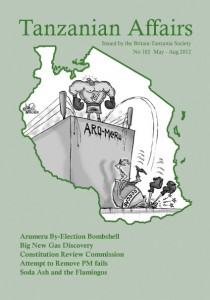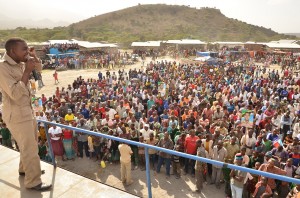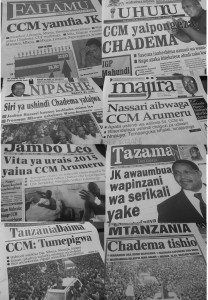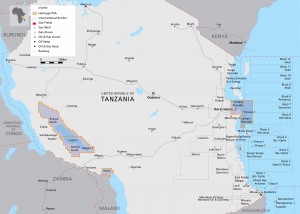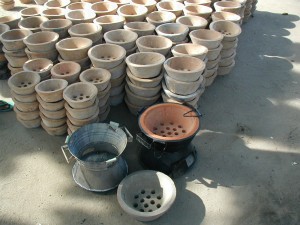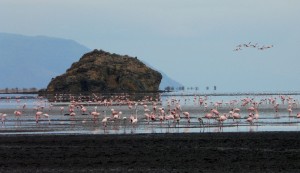UPDATE: In fact the aims to remove five ministers suspected of corruption where successful – please see update at end of article (events came after printed edition went to press)
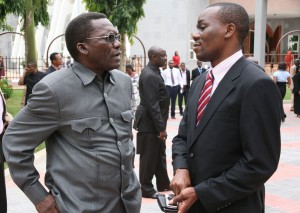
Prime Minister Mizengo Pinda and Zitto Kabwe, Chadema MP, pictured in February 2011 (Photo Prime Minister’s office)
As this issue of TA went to press a determined attempt in Parliament to force the resignation of Prime Minister Mizengo Pinda failed. On April 23, after a week of high drama in the National Assembly, Chadema Deputy Leader in the House, Zitto Kabwe, who following the Arumeru by-election now has 49 MPs, drew up a motion of no confidence in the government. The original target of the angry MPs was a group of five government ministers, headed by the Minister of Finance, considered to be the main culprits. But it soon became apparent that a vote of no confidence in these ministers had to be addressed to the Prime Minister and not to minsters who served under him. Defenders of the Prime Minister later objected that he himself had done nothing wrong.
The crisis arose when President Kikwete was in Brazil attending a conference and, later, for a brief time, in Malawi, attending the funeral of the late President Mutharika, so that responsibility fell firmly on the shoulders of the PM.
This saga is long and complicated and the issue seems likely be raised again when parliament re-assembles in June after a recess.
Report of the Controller and Auditor General
Every year, for many years, the Controller and Auditor General (AG) has published an annual report summarising the financial performance of the various ministries of government. These reports have often been highly critical but have frequently been swept under the carpet and actions to punish those in error have been rare.
A press release from Sikika (info@sikika.or.tz) on April 22 provided some details about the various alleged misdemeanours:
‘There were goods paid for but not delivered amounting to TShs 31 billion and expenditures not properly supported amounting to TShs 8 billion. There were salaries paid to retirees, absentees and ineligible officers amounting to TShs.143 million and questionable payments amounting to TShs.1.5 billion….. There were also cumulative losses incurred by the Government in terms of public monies, stores written off and abandoned claims that had increased from TShs.11 billion during the year 2009/2010 to almost 13 billion in 2010/2011. In the health sector payments amounting TShs 77 million were made without supporting payment vouchers, salaries amounting to TShs 50 million were paid to retired workers and nugatory expenditures amounted to TShs 32 million. It was further reported that in 2011 the Health ministry spent about TShs 1 billion on the Nane-nane celebrations while in the same year the Ministry failed to pay intern doctors allowances amounting to TShs. 176 million only. It was this lack of priorities within the Ministry that led to the doctors’ strike earlier in the year.’
In its research on the whole matter the media and, in particular, the social networks, soon began to publish many highly confidential and secret government documents which is an unusual new development in Tanzania.
Mobilising support
On April 19, in what was described in the Citizen as an extraordinary move, opposition MPs, who frequently differ strongly, put aside their differences and teamed up to call for the resignation of five cabinet ministers adding that they would demand the resignation of the PM if the ministers did not resign voluntarily. 39 Chadema MPs signed plus 27 from CUF and the two from the smaller parties. The ministers were accused of corruption and presiding over incompetence and embezzle¬ment of billions of shillings by public servants.
Strenuous efforts were made to persuade a few unhappy CCM (government party) MPs to join the action but most were dissuaded by their Party leadership.
However, Ludewa MP Deo Filikunjombe was the first from CCM to publicly admit to having signed the petition and it seems that three or four other CCM MPs signed quietly. Mr Filikunjombe was quoted as saying that he had decided to sign as a representative of the people. “We are all aware of the rot in the government and what we need now is change, not a revolution…..I was summoned by a Minister in the Prime Minister’s Office but I knew what he wanted so I decided to sign first before I went to see him. When we met I told him that I had signed the petition and why I had decided to do so.”
By this time Mr Kabwe was oozing confidence saying that he would easily surpass the 20% rule but things then started to go wrong.
The Speaker’s ruling
National Assembly Speaker Anne Makinda finally ruled out the possibility of a motion of no confidence. She said that National Assembly Standing Orders stipulated that for a petition to be accepted it had to be submitted to the Speaker at least 14 days prior to the day such a motion was to be moved. This was not possible as the House was about to go into recess.
Another hurdle was Section 133 (2) (b) of the Standing Orders. The section categorically stated that any motion for a vote of no confidence in the Prime Minister could not be moved if, among other things, there were no allegations that the PM had contravened the Public Leadership Code of Ethics Act. MPs pushing for the passing of the motion had not so far presented any proof that the PM had contravened this ethics law. The Speaker was required to ascertain that this criterion was strictly met.
One CCM MP said that Kabwe had hijacked a CCM agenda as it was the ruling party MPs who had decided in their caucus to ask President Kikwete to sack five ministers.
MP for Sumwe Richard Ndassa told The Citizen on Saturday that Chadema had no basis for reprimanding the PM. “It is true that some ministers are not working as required. But is that ground enough to censure the Prime Minister? You can’t make the Premier accountable for mistakes committed by ministers,” he said.
Presumably everyone will now wait until June.
UPDATE – MID MAY 2012
(In the light of political developments after Tanzanian Affairs No 102 had been
printed it is necessary to make amendments to this article. In fact, the organisers of the proposed vote of no confidence were not aiming to remove the Prime Minister
but wanted to remove half a dozen ministers who had been severely criticised in the annual report of the Controller and Auditor General. In this aim the proposers eventually did not fail; they actually succeeded, as is explained in the amendment below- Editor).
When President Kikwete returned from his overseas travels CCM MPs asked him to take strong action. He therefore first got the authority of the Central Committee of the Party to allow him to take whatever action he felt appropriate. In a confused situation the President then announced that he was ‘reshuffling’ his cabinet. Six ministers (including those responsible for Finance, Energy, Industry, Transport and Health) and two deputy ministers were asked to resign.
So as to ensure that they did so, he immediately appointed new ministers to succeed them. Prominent among these is Dr Harrison Mwakyembe who made his name when he chaired the enquiry commission on the Richmond electricity generation scandal. He is the new Minister of Transport and will be responsible for problems created following the termination of the management contract with the RITES Indian railway company.
Thus the threatened vote of no confidence (which was eventually supported by 72 MPs from all parties including CCM) turned out to be not a failure but a rather remarkable success. The opposition CHADEMA’s Zitto Kabwe MP could hardly conceal his sense of satisfaction and immediately began lecturing the new ministers on what they should and should not do. He was quoted in the Guardian as saying that he would consult his fellow MPs on whether or not to proceed with the vote of no confidence when parliament resumed its sittings.
Praise for President Kikwete’s rapid action has been widespread and the CCM has made it clear that the Party would neither defend nor have mercy on ministers found wanting by investigations that are set to be carried out by the Prevention and Combating of Corruption Bureau (PCCB).
